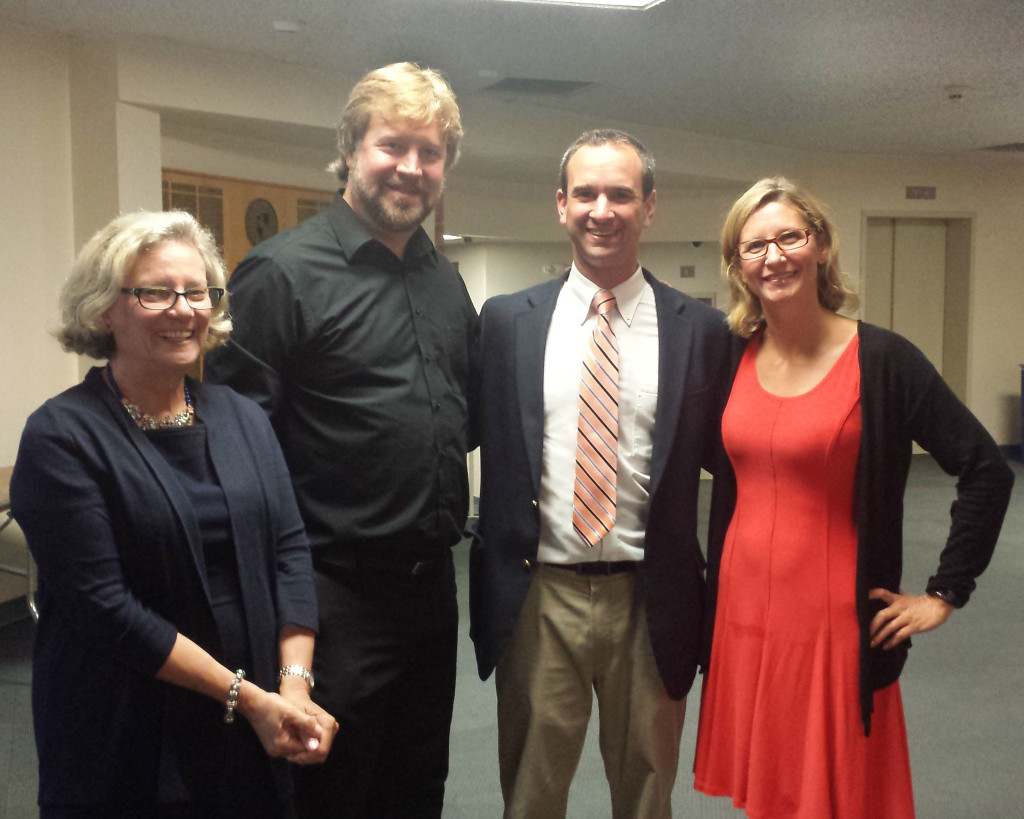Caldwell University
October 1, 2015
Alum, NJ Teacher of the Year tells students ‘teach from the heart’

Caldwell University alum Mark Mautone has traveled 22,189 miles this past year as New Jersey State Teacher of the Year. His adventures have taken him everywhere from Space Camp to the White House. No matter where he is headed, the goal is always the same, sharing knowledge, inspiring others to be better teachers, and to “not give up on students.”
Speaking to Caldwell University undergraduate and graduate education and applied behavior analysis students on September 29, Mautone encouraged them to “teach from the heart, come up with solutions,” and not be afraid to make mistakes. “The first time it is a mistake. The second time it is a decision.”
Mautone recounted his journey in teaching, which began 20 years ago with a severely disabled 5-year-old child. “I didn’t have the skills. I didn’t think I’d get past the third day.” But he knew that could not give up on the child because all he could think of was how someone else might not give that child a chance.
Mautone went on to receive his bachelor’s from Kean University and a master’s in applied behavior analysis from Caldwell, which he credits with giving him a solid background to effectively teach children on the autism spectrum and with rigorously pushing him to achieve high professional standards.
Today he is a special education teacher at Wallace Elementary School in Hoboken. His research has focused on ways to properly use technology to help children on the autism spectrum learn.
He stressed the importance of building a strong network outside the classroom —“getting yourself out there.” He explained how his collaborations with various organizations including Macworld/iWorld, the National Catholic Partnership for Disabilities, the U.S. Department of Education, NJEA, and Autism Speaks have helped him grow professionally and make contacts. “If someone asks you to serve on a panel, you never want to turn down that opportunity. You may initially have second thoughts on participating because you may feel that you’re not too knowledgeable on the panel topic, but you were asked for a reason,” Mautone said. This provides an opportunity to learn by doing further research and seeking out other professionals. “Embrace mistakes. They are going to happen.”
It is important to “get to know your students, surround yourself with positive people…don’t be afraid to ask for help… and smile. That might be the only smile the student gets all day,” he added.
Dr. Joan Moriarty, associate dean of the Education Division, encouraged the students to make Mautone’s teaching tips part of their professional journey.
Dr. Sharon Reeve, chair of Caldwell’s ABA department, said Mautone is a good example of a person who proved that you can bring the fields of education and ABA together, be impactful, and make a difference in a child’s life.
Ashley McDowell, a senior music education major said Mautone was humble and she appreciated his teacher tips.
“Powerful 45 minutes,” was how graduate student Mike Haber described the presentation. Katelyn Hart, who is student teaching 3rd grade, said it inspired her to be a better teacher and a better person.
Dr. Christine Johnson, superintendent of schools in Hoboken, also a Caldwell alumna, was in the audience. She echoed Mautone’s sentiments saying education is all about “making connections with people, making a difference for the children we are serving.”
In April Mautone was welcomed to the White House by President Obama along with the other state teachers of the year, and this fall a Classroom Closeup television program featuring Mautone’s work received an Emmy. They have all been wonderful experiences, but perhaps one of the most memorable was the trip he made this past summer to Pennsylvania to visit that very first student, who is now a young adult. After a few minutes of hesitation, there was a connection, “just like in the old days,” said Mautone.
Haber said Mautone’s story of his first student was a wonderful mini-lesson. It showed that “any lesson can propel you forward.”





